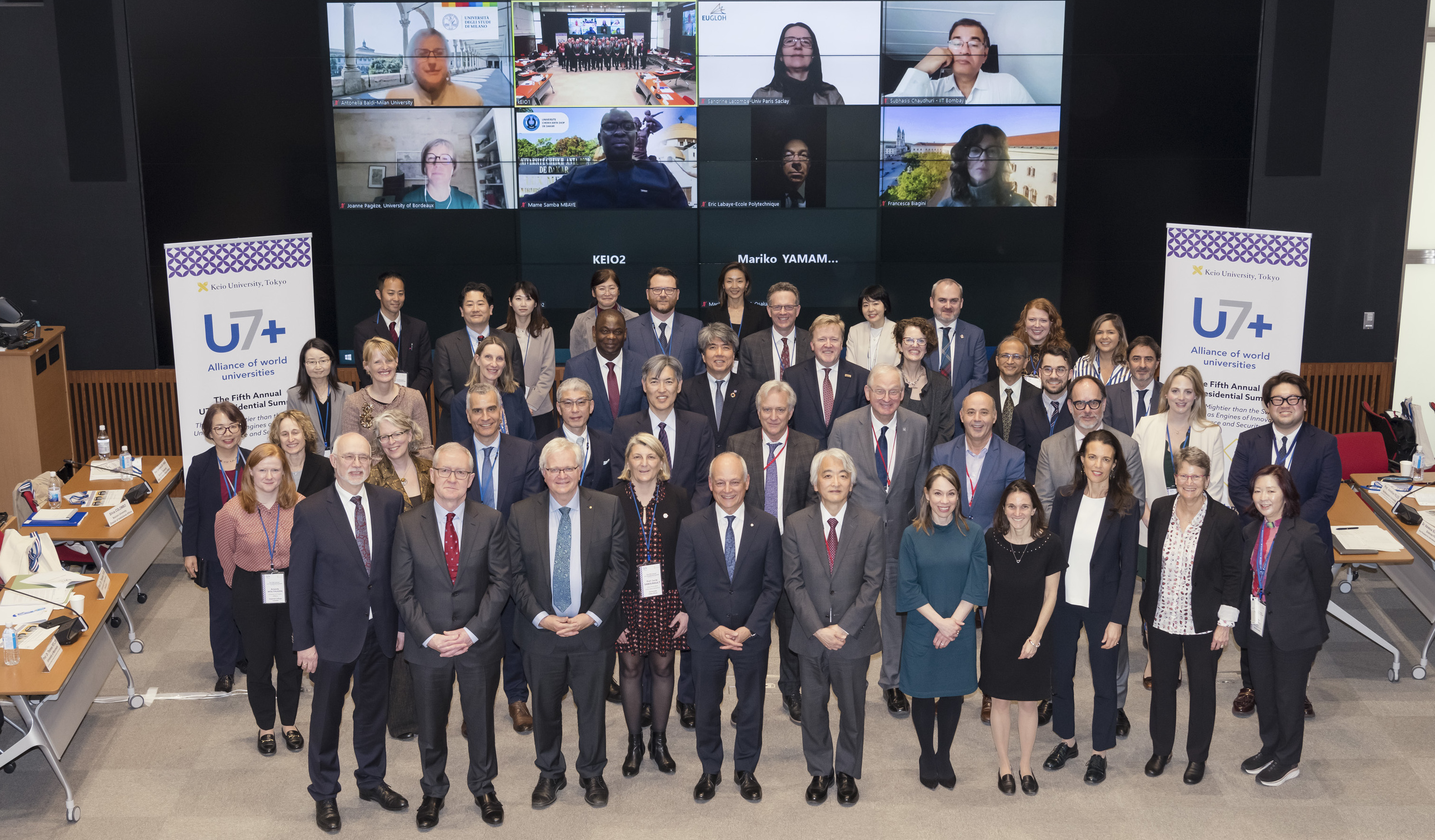2023 U7+ Statement to the G7
Tokyo Statement on Peace and Security: Universities as Engines of Innovation for Peace and Security

Members of the U7+ Alliance of World Universities convened at Keio University in Tokyo, Japan for the 5th annual U7+ Presidential Summit March 16-17, 2023.
We the Presidents of the U7+ Alliance of Global Universities, an alliance of over 40 universities on five continents dedicated to taking action to address global challenges in support of the G7 agenda, commit to working together through education, research and public engagement to foster a more peaceful and secure world.
As the G7 convenes in Hiroshima in May 2023, the world faces significant challenges to peace and security. Armed conflict or threats of conflict in many regions of the world, in disregard for international law and humanitarian law, have resulted in violations of human rights and new security threats. We note in particular, for the first time in a generation, the open threat of the use of nuclear weapons. Violence against women and girls, LGBTQ+ and other marginalized groups is also a paramount security threat in many regions.
The world has seen significant innovation in warfare; it is now time for innovation in peace and security. Traditional notions of negative peace as the absence of violence or threat of violence are now increasingly replaced by a recognition of the need for positive peace– comprehensive, long-term and complex understandings of the patterns and processes that lead to sustainable peace, including strong institutions, economic stability, and social inclusion.
Universities are uniquely positioned to innovate for peace and security through research, education, and international exchange. The U7+ Alliance, with its strong multilateral ties between top research universities in both G7 and non-G7 nations, can generate new solutions across traditional geopolitical barriers.
Our Commitment: Becoming Engines of Innovation for Peace and Security
We commit to working together as an alliance of universities to prioritize and advance peace and security in four key areas:- Preparing the Next Generation of Leaders
- We commit to providing students with opportunities to learn about the causes of conflicts and the methods of peacebuilding, in modalities appropriate to our individual institutional contexts, to support one another’s work, with particular regard for our members in the Global South, and to report regularly to one another on our curricular offerings in this area.
- Research for a More Peaceful and Secure World
- We commit to academic freedom in peace and security research.
- We commit to supporting research on issues of peace and security, and to sharing the findings of our research with policymakers and the public.
- We commit to sharing experiences within our institutions regarding research ethics and research security, including the regulation of dual use technologies like artificial intelligence.
- We commit to mainstreaming a gender perspective in such research, supporting a range of disciplinary perspectives on peace and security, and to working to diversify the field.
- Creating Opportunities for Those Displaced by Conflict
- We commit to providing students and scholars displaced by conflict, persecution and humanitarian crises with opportunities to teach and learn on our campuses.
- Public and Multilateral Engagement
- We commit to greater collaboration with the G7 and with United Nations bodies devoted to preventing conflict.
- We commit to working for public understanding of peace and security issues.
Requesting G7 Leaders' Commitment
We respectfully request that G7 leaders work with the U7+ to prioritize and advance peace and security in four key areas:- Invest in Peace and Security Education at All Levels
- G7 governments should invest in education that fosters deeper cross-border and cross-cultural understanding by working with universities to enhance student mobility on a global scale by reducing visa and financial barriers.
- G7 governments should direct new resources towards access to education in conflict zones or for those displaced by conflict.
- Incorporate the Latest Research into Policy on Peace and Security
- G7 leaders should commit to frequent multinational dialogue between research universities and governments about peace and security issues through jointly sponsored seminars and conferences. Together, we can create new opportunities for the incorporation of the latest research into policy.
- Diversify Thinking about Peace and Security
- The inclusion of more women, youth and cultural minorities and voices from the Global South, as well as of more disciplinary perspectives, in high level policy discussions is critical.
- Defend Academic Freedom and Free Speech
- Democratic governments must support academic freedom in educational and research institutions and safeguard open debate on policy issues surrounding peace and security and must pursue policies that protect researchers and students from pressure from domestic or foreign governments.
- Democratic governments must support academic freedom in educational and research institutions and safeguard open debate on policy issues surrounding peace and security and must pursue policies that protect researchers and students from pressure from domestic or foreign governments.
View the Japanese translation of this statement (和訳)
About the U7+ Alliance of World Universities
The U7+ is an alliance of university presidents aimed at structuring and advancing the role of universities as global actors across a multilateral agenda. As members of this alliance, university presidents take stock of their institutions’ unique civic and social responsibilities as global actors, and pledge to take collective concrete action for local, regional and global impact. The U7+ Alliance includes 90+ presidents and leaders of universities from 19 countries on 6 continents.